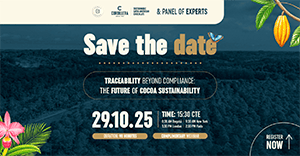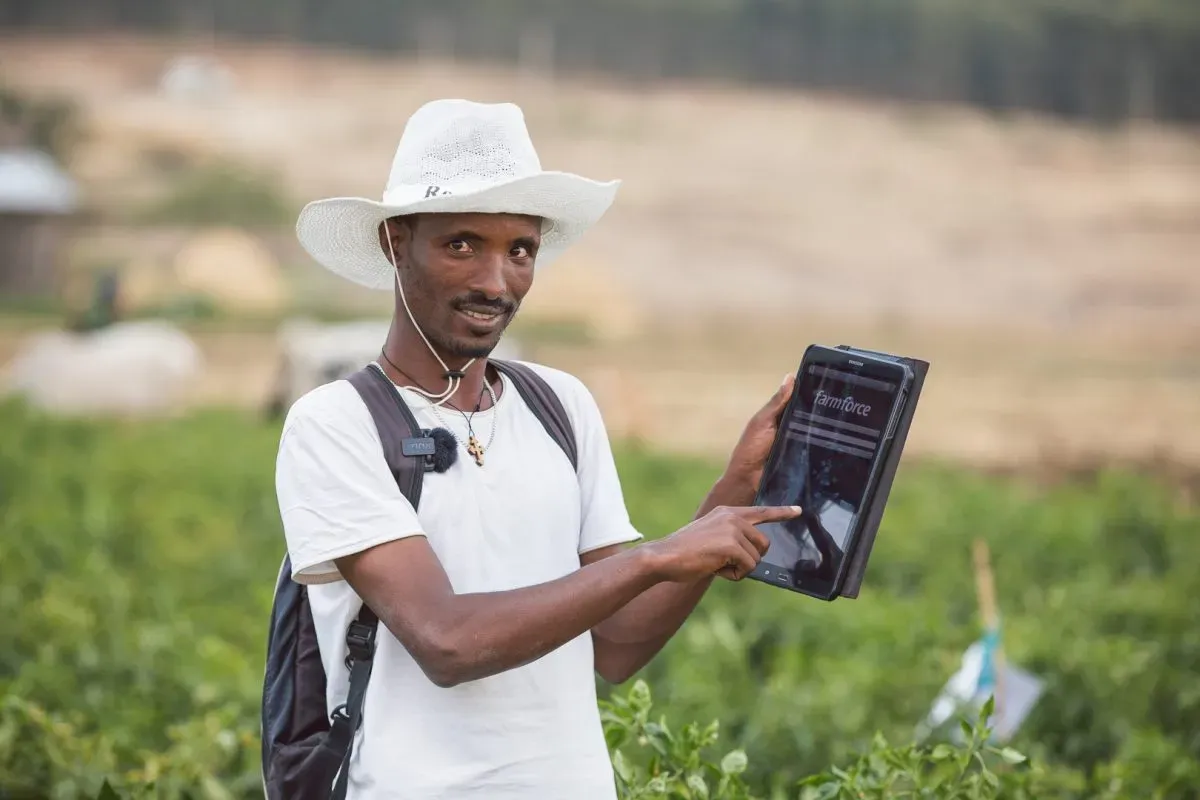The company, created in 2012 as a non-profit initiative by the Syngenta Foundation, has been confirmed as a featured guest in the upcoming industry webinar: Beyond Compliance: Traceability as the Future of Cocoa Sustainability (hosted by Cordillera Chocolate and published by CocoaRadar) — underlining just how central traceability has become to cocoa’s coming season.
Farmforce’s mission is to digitalise smallholder supply chains. In 2017, it became a private entity, maintaining its focus on building technology for agricultural transparency and efficiency, by ‘empowering agri-businesses with first-mile traceability technology that brings sustainability, compliance, and operational efficiency, from the producers to the first collection point.’
In its recent report 2025‑2026 Cocoa Season Outlook: Challenges and Sustainability in Focus, Farmforce outlines a series of converging pressures: tighter regulation, evolving sustainability demands, shifting supply‑chain dynamics and heightened risk in origin countries.
For industry players, the message is increasingly clear: tracking where cocoa comes from — and what has happened on the ground — is no longer a nice‑to‑have. It is increasingly non‑negotiable.
Regulatory Compliance
Our upcoming webinar provides a platform to transition from broad strategy to practical action. Farmforce’s inclusion signals that the conversation will encompass not only regulatory compliance (EUDR) but also the technologies and methodologies necessary to meet those obligations.
As a primer for the high-level webinar, we delved into the report, and several themes stand out:
- Regulatory pressure tightens: Many cocoa companies are grappling with how they will meet the traceability, deforestation‑risk and sustainability‑reporting requirements that are now being pushed harder by retailers and governments.
- Traceability as driver, not just compliance: Farmforce argues that traceability systems are evolving from a back‑office task into a strategic asset: ‘Farm mapping, GPS, farm‑level data sets, deforestation monitoring’ are mentioned as core.
- Supply risk remains elevated: Weather volatility, ageing trees, disease pressure, and input cost inflation are all flagged as variables that may disrupt yields — making the case for ‘early awareness’ in the chain stronger than ever.
- Sustainability metrics expanding: It’s no longer enough to trace beans and avoid deforestation: Farmforce flags that future metrics may cover living income, biodiversity, carbon, and human rights — and traceability systems will need to feed into all of those.
Together, these signals suggest that 2025‑26 is set to be a transition year: from regulatory wait‑and‑see into operational readiness. And for many cocoa‑supply‑chain actors, that means asking:
“How do we know what we know, when did we know it, and can we prove it?”

About the Webinar
The ‘Beyond Compliance’ webinar will feature Cordillera Chocolate and Farmforce, among others, and is positioned to help industry professionals translate the big picture into actionable steps. Key agenda items will include:
- How traceability systems (farmlevel, GPS / polygon mapping, satellite overlays) are evolving in response to regulation and market demands
- Practical insight from Farmforce on how these systems are being implemented in producing countries — and the lessons learned so far
- Q&A on how traceability intersects with broader sustainability metrics (biodiversity, carbon, human rights) — going beyond deforestation to full‑chain responsibility
- A chance for participants to benchmark their own traceability readiness ahead of upcoming regulatory deadlines
For cocoa brands, processors, traders and sourcing teams, this may be one of the most timely webinars of the year. With supply‑chain risk elevated and regulatory deadlines looming, understanding how to build traceability into daily operations is less optional than ever.
Industry Outlook & What to Watch
As the Farmforce document and broader market reporting hint, several variables will shape the cocoa season ahead:
- Regulation implementation timing – Delays or clarifications in the EUDR and related rules may affect when and how companies must report traceability and deforestation‑risk data.
- Origin performance – If major origins such as Ghana or Côte d’Ivoire deliver weaker harvests than hoped, traceability pressures may compound with supply risk.
- Data integrity and infrastructure – It’s one thing to map farms on paper. It’s another to build, digitise, verify and maintain the systems reliably at scale. Farmforce emphasises this challenge.
- Cost implications – Traceability doesn’t come for free. The cost burden — for farm mapping, data capture, verification, audits — will increasingly factor into sourcing strategies and pricing.
- Strategic shift in traceability mindset – As Farmforce suggests, the ideal state is predictive (anticipating risk) rather than reactive. That requires more advanced data and analytics, and industry actors who invest earlier may gain a strategic advantage.
What You Should Do Now
If you’re in cocoa sourcing, sustainability, brand compliance or supply‑chain management, here are three immediate actions:
- Register for the webinar: Don’t wait until the season is fully underway. This webinar is a timely opportunity to see how others are doing it and to ask your own questions.
- Audit your traceability readiness: Do you currently map farms to GPS or polygons? Do you receive satellite or verified deforestation‑risk data? Are you capturing farm‑level volumes linked to origin?
- Think beyond seeds & beans: Traceability systems will increasingly underpin broader sustainability metrics. Begin thinking now: Are you set up to monitor, report or act on living‑income, biodiversity, human rights — not just deforestation?
- Register for the webinar here

